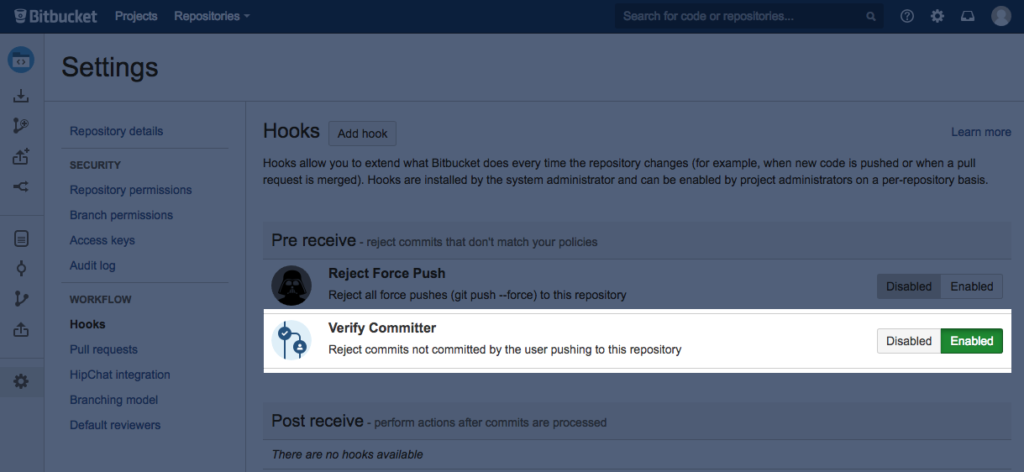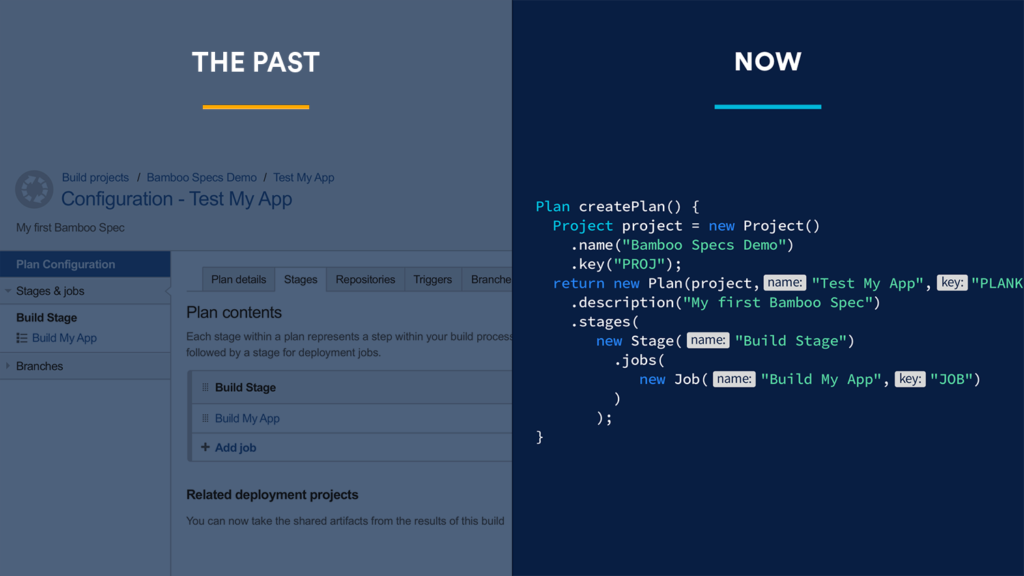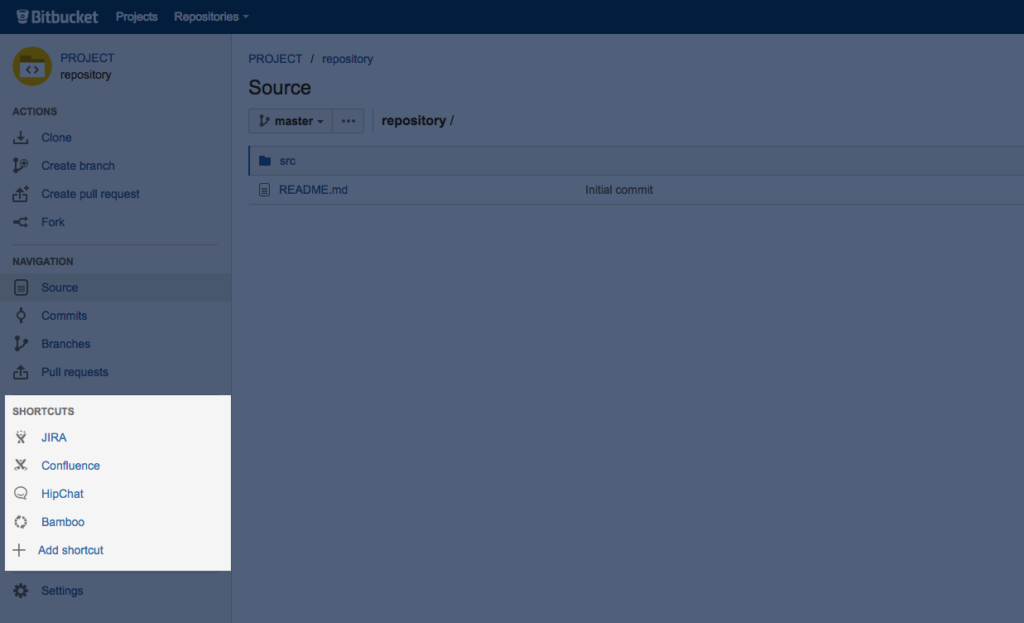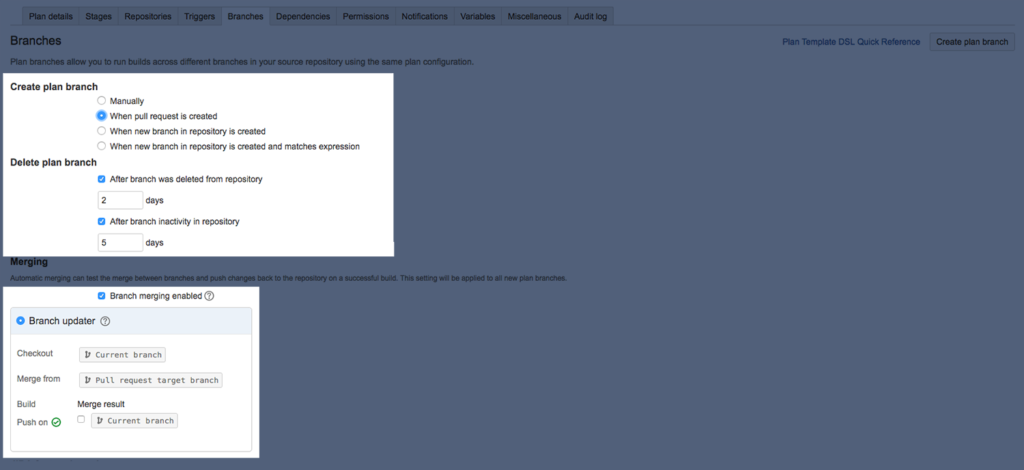According to our recently released DevOps Maturity Report with xMatters, 43% of respondents in organizations of 1000 or more said they either didn’t know of or didn’t have a DevOps initiative in place. With proven benefits like faster time to market and better release quality, why aren’t more enterprises embracing DevOps?
The answer is simple: changing the way teams work isn’t easy. For teams of all sizes, the journey to DevOps can be fraught with roadblocks. For those in the enterprise, challenges like lack of visibility, deep-rooted cultural silos, disconnected tools, and complicated compliance requirements are magnified, making DevOps adoption nearly impossible.
For years, Bitbucket Server and Bamboo have been tackling these challenges, helping software teams build better software faster. Today we’re taking it up a notch with Bitbucket Server and Data Center 5.0 and Bamboo 6.0, giving development teams the freedom, speed, and automation they desire while meeting the demanding needs of their enterprise organization.
DevOps for the enterprise
Adopting DevOps in the enterprise is more than just better communication across operations and development, modern continuous integration practices, or the type of version control in place. Things like compliance and scale become just as important. Tooling must provide freedom and structure, scalability and performance – things that are not often found together.
Atlassian tools have the unique ability to make DevOps workflows a reality while ensuring traceability, availability, and security all remain intact. In Bitbucket Server and Data Center 5.0, and Bamboo 6.0 we’re upping the ante with a committer verification Git hook and updates to smart mirrors.
Committer verification
Git and distributed version control have many benefits out of the box, but controlling access and workflows isn’t one of them. For example, without a Git management tool, a developer can push commits that others have written to the central repository.
This creates problems for organizations with strict security and compliance requirements. Bitbucket lets you address this through permissions and workflow controls including Git hooks. In 5.0, we’ve added a new committer verification hook, which enforces that only the author of a commit can push those changes back to Bitbucket Server or Data Center. Now you can sleep easy knowing that only authorized code changes can make it to your repositories.
Smart mirroring gets smarter
Smart mirroring in Bitbucket Data Center is a hassle-free way of providing geographically dispersed teams a read-only copy of the repository. By pulling updates from a local mirror, teams can avoid the pain of high-latency and low-bandwidth clone operations. All authentication, permissions, and updates are controlled by the master data center instance keeping admin maintenance to a minimum.
In Bitbucket Data Center 5.0 we’re introducing authentication caching – a way for end users to maintain mirror access even in the event of short outages. Instead of communicating to the main server for every login event, credentials are now cached on the mirror for 5 minutes at a time. If network connection is patchy or the main server is offline, users can still fetch/clone using the cached credentials. You can rest easy knowing that Bitbucket Data Center’s active-active clustering, disaster recovery, and now authentication caching ensures your code will always be available.
Productivity at scale
With DevOps, development teams boost productivity through workflow automation, tighter communication across teams, and easier access to information (e.g. build and development status on JIRA issues and pull requests). Bitbucket Server & Data Center 5.0 and Bamboo 6.0 bring these key elements to the enterprise with more transparency and modernization of the release pipeline.
Bamboo Specs
First up, we’re modernizing the way builds are configured with Bamboo Specs, the ability to define Bamboo plan configurations as code. Changing build configurations no longer requires edits in the Bamboo user interface, instead configurations can be stored as code. Beyond simplifying application build, defining plan configurations as code provides benefits such as code reuse, proper code reviews, versioning, and so on. The best part? Bamboo Specs is native to Bamboo, no plugins or additional duct tape required.
Tip:
Did you know you can use our Bamboo Specs exporter feature to automatically create a Spec out of your existing plans? Learn more
Tighter integrations between Bitbucket Server and Bamboo
Next up we’re breaking through silos and introducing tighter integrations between Bitbucket Server, Bamboo, and JIRA Software Server. Development teams already benefit from tracking work items through JIRA Software to commits and pull requests in Bitbucket Server, and builds and deployments in Bamboo.
Traditionally, the link between JIRA Software and Bitbucket has been on the commit level (i.e. commit A pertains to JIRA issue ABC-123). In Bitbucket Server 5.0 we’re adding repository level shortcuts allowing teams to connect a repository to any related asset, like a JIRA project. Repository shortcuts make it easy for everyone on the team to find and jump to repository information. Simply link to your JIRA board, Confluence space, Bamboo plans, HipChat room, or whatever else that’s important to you.
Bamboo’s integration with Bitbucket Server is also getting an upgrade. Currently, we display build status (e.g. pass/fail) on related commits, branches, and pull requests in Bitbucket Server, but teams were unable to see Bamboo builds in-progress or trigger builds on pull request creation. With the addition of in-progress build status and pull request aware builds in Bamboo, developers gain more control over when their builds kick off and can monitor progress from inside Bitbucket. This frees up Bamboo build agent resources and cuts down on unnecessary build noise. Even better, if you’re not using plan branches already, now you can, and know that every pull request will get built. For more information on all of the Bitbucket Server and Bamboo integration enhancements, check out our integration guides.
… there’s room for some fun too
Productivity at scale isn’t all integrations and workflow. In Bitbucket Server & Data Center 5.0, let your team know how you really feel with emoji and HipChat emoticon support for comments. To look for the perfect emoji type ” : ” which brings up the list of available options.
Making DevOps in the enterprise possible
Changing the way your teams work, adopting new tools, and learning new technologies is hard and doesn’t happen overnight. When you add disconnected tools, complicated compliance requirements, and scalability to the mix it makes “going DevOps” that much more difficult. No matter where you are in your DevOps journey, Atlassian provides the guidance and tools to help you succeed. If you’re ready to modernize your version control and continuous integration practices, give Bitbucket Server/Data Center and Bamboo a try.
For more information on other improvements and bug fixes in Bitbucket Server & Data Center 5.0 and Bamboo 6.0 check out our Bitbucket and Bamboo release notes.





